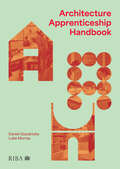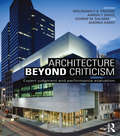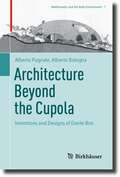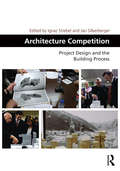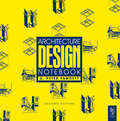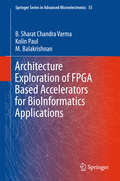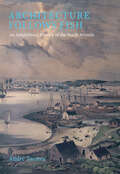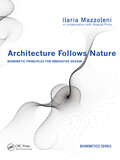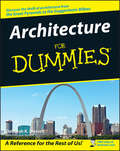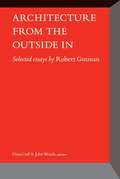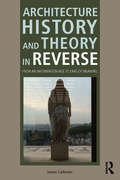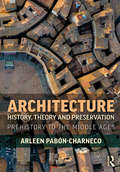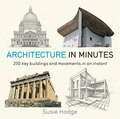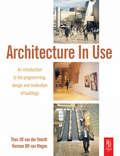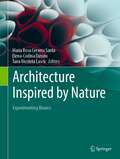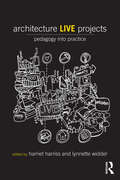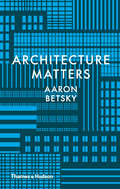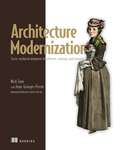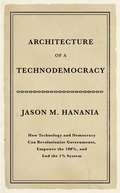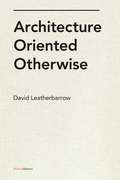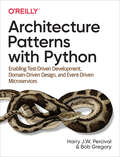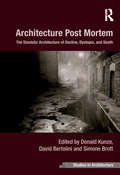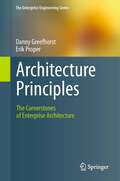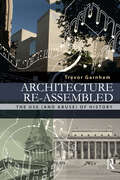- Table View
- List View
Architecture Apprenticeship Handbook
by Daniel Goodricke Luke MurrayArchitecture apprenticeships are a new route into the profession. Having gained traction since their inception in 2018, it is an attractive route for young generations of architects to obtain their professional qualifications and earn while they learn. Aimed at prospective and current Level 7: Architect Apprentices, this guide provides the knowledge to achieve the most from your apprenticeship education, empowering your exposure in the profession within academic and professional areas. Taking you on a journey through the apprenticeship, it presents key stages of the course through precedents and will let you know what to expect from this educational route, and when to expect it. Using case studies from recent graduates and current apprentices who have excelled through this route, it features information from employers and academics involved in architecture apprenticeship courses in the UK to provide tips, advice and guidance. Designed to be interactive, you will be able to populate and annotate the book at various stages to map the key stages of your journey and reflect on your professional development.
Architecture Beyond Criticism: Expert Judgment and Performance Evaluation
by Wolfgang F. Preiser Ashraf M. Salama Aaron T. Davis Andrea HardyFor the first time, this book demonstrates that the two paradigms of architectural criticism and performance evaluation can not only co-exist but complement each other in the assessment of built works. As architecture takes more principled stances worldwide, from environmental sustainability to social, cultural, and economic activism, this book examines the roles of perceived and measured quality in architecture. By exploring in tandem both subjective traditional architectural criticism and environmental design and performance evaluation and its objective evaluation criteria, the book argues that both methodologies and outcomes can achieve a comprehensive assessment of quality in architecture. Curated by a global editorial team, the book includes: Contributions from international architects and critics based in the UK, USA, Brazil, France, Qatar, Egypt, New Zealand, China, Japan and Germany Global case studies which illustrate both perspectives addressed by the book and comparative analyses of the findings A six part organization which includes introductions and conclusions from the editors, to help guide the reader and further illuminate the contributions. By presenting a systematic approach to assessing building performance, design professionals will learn how to improve building design and performance with major stakeholders in mind, especially end users/occupants.
Architecture Beyond the Cupola: Inventions and Designs of Dante Bini (Mathematics and the Built Environment #7)
by Alberto Pugnale Alberto BolognaThis book reviews Dante Bini’s inventions and designs, focusing on his form-resistant Binishell and other pneumatic construction systems. Dante Bini’s double profile of architect and builder underpins the narrative of the entire book. It is used to analyse the evolution of the early reinforced-concrete Binishell patent into a variety of automated construction systems based on the use of air. Dante Bini has always been quite proactive in promoting his work and disseminating the results of his experimentations and achievements via journal articles, conference presentations and public talks; promotional brochures in multiple languages were also prepared to export and license his patents in various countries, from Italy to the Americas and Australia. Despite this, a rigorous study of Dante Bini’s work is still unavailable, and the relevance of this figure to contemporary architecture has yet to be discussed comprehensively. This book fills in this gap and arrives at the right time: during the last two decades, there has been an exponential interest in shell and spatial structures, particularly concerning the use of complex geometries and innovative construction techniques. This book will be of interest to academics in architectural design, theory and construction history, and practitioners and students interested in expanding their knowledge in the design and construction of shell and spatial structures.
Architecture Competition: Project Design and the Building Process (Design and the Built Environment)
by Ignaz Strebel Jan SilberbergerMuch valued by design professionals, controversially discussed in the media, regularly misunderstood by the public and systematically regulated by public procurement; in recent years, architecture competitions have become projection screens for various and often incommensurable desires and hopes. Almost all texts on architectural competition engage it for particular reasons, whether these be for celebration of the procedure, or dismissal. Moving on from such polarised views, Architecture Competition is a revelatory study on what really happens when competitions take place. But the story is not just about architecture and design; it is about the whole construction process, from the definition of the spatial programme, to judgement and selection of projects and the realization of the building. This book explores the competition in the building process as it takes place, but also before and after its execution. It demonstrates that competitions are not just one step of many to be taken, but that competitive design procedures shape the entire process. Along the way the book exposes, among others, one of the key evolutions of design competitions – that competition procedures need to be regulated in order to respond to public awarding rules and need to integrate an increasing amount of given standards regarding, for example, efficiency, fire safety and thermal comfort. These notions force competing architects to respond to inflexible and overloaded competition programmes instead of focusing on genuinely crafting an architectural project. If the architecture competition wants to be more highly valued as a design tool, it should pay attention to the iterative nature of design and to the fact that perspectives on the problem often change in process.
Architecture Design Notebook
by A Peter FawcettArchitecture Design Notebook focuses on the process of design as pragmatic and non-theoretical. Dealing systematically with the core design curriculum, it clearly demonstrates the skills required for designing at undergraduate level. Providing students with fundamental maxims of design, and a framework within which they can approach their work, this book supports undergraduates as they learn to produce solutions to design challenges. This vital design companion underpins the cornerstone of an architectural undergraduates' studies - studio design projects. With over 100 sketches included, the book inspires student's design ideas. This updated edition includes new sections on green architecture, urban space typology, and the virtual building. A. Peter Fawcett is an architect and critic who combines teaching with sporadic practice; he is currently Professor Emeritus of Architecture at the University of Nottingham and visiting Professor at the University of Lincoln. In recent years his work has been placed in architectural competitions and has been hung at the Royal Academy and Royal Ulster Academy.
Architecture Exploration of FPGA Based Accelerators for BioInformatics Applications (Springer Series in Advanced Microelectronics #55)
by B. Sharat Chandra Varma Kolin Paul M. BalakrishnanThis book presents an evaluation methodology to design future FPGA fabrics incorporating hard embedded blocks (HEBs) to accelerate applications. This methodology will be useful for selection of blocks to be embedded into the fabric and for evaluating the performance gain that can be achieved by such an embedding. The authors illustrate the use of their methodology by studying the impact of HEBs on two important bioinformatics applications: protein docking and genome assembly. The book also explains how the respective HEBs are designed and how hardware implementation of the application is done using these HEBs. It shows that significant speedups can be achieved over pure software implementations by using such FPGA-based accelerators. The methodology presented in this book may also be used for designing HEBs for accelerating software implementations in other domains besides bioinformatics. This book will prove useful to students, researchers, and practicing engineers alike.
Architecture Follows Fish: An Amphibious History of the North Atlantic
by Andre TavaresA highly original exploration of the history of architecture in relation to fish, shedding light on the connection between marine environments and terrestrial landscapes.Architecture Follows Fish is set in the North Atlantic, and its protagonist is fish. In this book author and architect André Tavares explores the notion of fishing architecture, a concept coined to describe architectural practices that are spawned by fisheries. To encompass the scope of fishing architecture, and to establish the connections between marine ecology and architectural practice, the book oscillates between different continents, centuries, and species. Fisheries are unique, and this book sheds light on that uniqueness through an articulated narrative and a wealth of iconography.Up until now there has been no history of architecture from the perspective of fish, although there are counterparts for meat, timber, oil, and many other industries. Tavares provides a counternarrative to the traditional history of marine environments, which tends to focus on water ecosystems, and instead forms a bridge between what happens at sea and what happens on land. The hope is that, after reading this book, readers will better understand life in the sea in relation to urban growth and terrestrial landscapes.
Architecture Follows Nature-Biomimetic Principles for Innovative Design (Biomimetics Series)
by Ilaria MazzoleniThis full-color volume proposes an innovative methodology that uses the functional aspects of nature to inspire improvements in building design and form, encouraging designers to apply biomimetic principles to architectural processes. The book focuses on the analysis of various animal skins, translating the principles of communication, thermoregulation, water balance, and protection into the built environment. Illustrating how biomimetic principles can create a more sustainable way of building, this is the first time the author's new methodology-as well as the 12 case studies-has been published.
Architecture For Dummies (For Dummies Ser.)
by Deborah K. Dietsch* Just the essential information for readers on the go who want to understand architecture. * Covers the highlights of architectural history, from the Great Pyramids to Frank Gehry's Guggenheim museum in Bilbao. * Explains how to look at a building and appreciate it. Explains when a building's a building and when it's art. * Part of Tens includes: Ten Great Architectural Masterpieces, Ten Biggest Architectural and Engineering Failures, Ten of the Most Interesting Architects Working Today-and more.
Architecture From the Outside In: Selected Essays by Robert Gutman
by Robert Gutman Dana Cuff John WriedtArchitecture and sociology have been fickle friends over the past half century: in the 1960s, architects relied on sociological data for design solutions and sociologists were courted by the most prestigious design schools to lecture and teach. Twenty years later, at the height of postmodernism, it was passe to be concerned with the sociological aspects of architecture. Currently, the rising importance of sustainability in building, not to mention an economical crisis brought on in part by a real-estate bubble, have forced architects to consider themselves in a less autonomous way, perhaps bringing the profession full circle back to a close relationship with sociology. Through all these rises and dips, Robert Gutman was a strong and steady voice for both architecture and sociology. Gutman, a sociologist by training, infiltrated architecture's ranks in the mid-1960s and never looked back. A teacher for over four decades at Princeton's School of Architecture, Gutman wrote about architecture and taught generations of future architects, all while maintaining an "outsider" status that allowed him to see the architectural profession in an insightful, unique way.
Architecture History and Theory in Reverse: From an Information Age to Eras of Meaning
by Jassen CallenderThis book looks at architecture history in reverse, in order to follow chains of precedents back through time to see how ideas alter the course of civilization in general and the discipline of architecture in particular. Part I begins with present-day attitudes about architecture and traces them back to seminal ideas from the beginning of the twentieth century. Part II examines how pre-twentieth-century societies designed and understood architecture, how they strove to create communal physical languages, and how their disagreements set the stage for our information age practices. Architecture History and Theory in Reverse includes 45 black-and-white images and will be useful to students of architecture and literature.
Architecture History, Theory and Preservation: Prehistory to the Middle Ages
by Arleen Pabón-CharnecoArchitecture History, Theory and Preservation critically explores the historic development, theoretical underpinnings and conservation practices of architecture. Complete with 170 full color images, this volume presents architectural and urban examples, from Prehistory to the Middle Ages, chronologically and thematically examining contextual issues that provide each period with distinctive expressions. The special features, structural systems, materials and construction technologies are analyzed, as well as how the international community deals with the task of interpreting and preserving certain historic properties. This publication provides professors and students of architecture, art history, historic preservation and related fields with an integrated view of architecture using historical, theoretical and conservation perspectives. As an architect, architectural historian and preservationist herself, Dr Pabón-Charneco weaves a field of relationships regarding each building, creating a silent yet empowering bridge between past and present.
Architecture In Minutes
by Susie HodgeIn this hyper-compact, fully illustrated guide to architecture, Susie Hodge outlines the history and theory of architecture from the earliest structures to the cutting-edge concepts of the present day. Along the way she profiles 200 key buildings, historic styles, architectural movements and celebrated architects from all around the world. Contents include theGreek orders, Roman engineering, Gothic architecture, the Renaissance, the Baroque, Revivalism, Art Nouveau, Modernism and Postmodernism, Futurism and Dynamic architecture along with architects like Inigo Jones, Christopher Wren, Gaudi, Frank Lloyd Wright, Le Corbusier and Frank Gehry.
Architecture In Minutes (IN MINUTES)
by Susie HodgeIn this hyper-compact, fully illustrated guide to architecture, Susie Hodge outlines the history and theory of architecture from the earliest structures to the cutting-edge concepts of the present day. Along the way she profiles 200 key buildings, historic styles, architectural movements and celebrated architects from all around the world. Contents include the Greek orders, Roman engineering, Gothic architecture, the Renaissance, the Baroque, Revivalism, Art Nouveau, Modernism and Postmodernism, Futurism and Dynamic architecture along with architects like Inigo Jones, Christopher Wren, Gaudi, Frank Lloyd Wright, Le Corbusier and Frank Gehry.
Architecture In Use
by DJM van der Voordt HBR van WegenThis unique book discusses programming, design and building evaluation providing a ‘joined up’ approach to building design. By linking the functional and architectonic qualities of a building, the authors show the practical implications of the utility value of buildings. Starting by looking at how the relationship between form and function has been dealt with by different approaches to architecture from a historical perspective, it goes on to discuss how the desired functional quality and utility value of a building can be expressed in a brief and given a physical form by the architect. Finally, it advises on how to carry out post-occupancy evaluation and provides the architect with methods and techniques for testing whether the intended utility value of a building has been achieved.
Architecture Inspired by Nature: Experimenting Bionics
by María Rosa Cervera Sardá Elena-Codina Dușoiu Tana Nicoleta LascuThe book brings together the research completed during 10 editions of International Seminars of Bionics, organized by the School of Architecture of the University of Alcalá de Henares, Madrid, several of them in partnership with the “Ion Mincu” University of Architecture and Urbanism, Bucharest, carried out in Spain and in Romania. The articles here consider advanced bionic design principles, implementing them to an impressive variety of application fields, including, but not limited to, urban planning and landscape, public space, architecture and building structures, design and detailing, application of natural dynamic processes, bio-digital architecture, innovative materials based on living organisms (micro-algae), and nano-modified materials. A particular focus is given to light and perception of light. To illustrate the principles developed, this contributed volume includes descriptions and full-color images of the experimental projects created during the workshops held in the framework of these ISB meetings: Learning from Nature, Integrating Bionics (2009); Adaptability, Efficiency and Biostructures (2010); Bionics and Innovation (2011); Forms and Structures Inspired by Nature (2016, 2017); Furniture Inspired by Natural Models (2018); Relation between Structure and Envelope: Light Structures (2019); Light, from Nature to Architecture. Structures Inspired in Nature (2020); Light in Architecture and Design: A Bionic Perspective (2021); Sustainable Thinking and Bionics (2022).
Architecture Live Projects: Pedagogy into Practice
by Harriet Harriss Lynnette WidderArchitecture Live Projects provides a persuasive, evidence-based advocacy for moving a particular kind of architectural learning, known as Live Projects, towards a holistic integration into current and future architectural curricula. Live Projects are work completed in the borderlands between architectural education and built environment practice; they include design/build work, community-based design, urban advocacy consulting and a host of other forms and models described by the book’s international group of authors. Because of their position, Live Projects as vehicle for simultaneously providing teaching and service has the potential to recalibrate the contesting claims that both academia and profession make to architecture. This collection of essays and case studies consolidates current discussions on theory and learning ambitions, academic best practices, negotiation with licensure and accreditation, and considerations of architectural integrity. It is an invaluable resource to current and future Live Projects advocates – whether they aim to move from pedagogy into practice or practice into pedagogy.
Architecture Matters
by Aaron BetskyAn illuminating introduction to the influence of architecture on the world, the environment, and human lives Architecture matters. It matters to cities, the planet, and human lives. How architects design and what they build has an impact that usually lasts for generations. The more we understand architecture—the deeper we probe the decisions and designs that go into making a building—the better our world becomes. Aaron Betsky, architect, author, curator, former museum director, and currently the dean of the Frank Lloyd Wright School of Architecture, guides readers into the rich and complex world of contemporary architecture. Combining his early experiences as an architect with his extensive experience as a jury member selecting the world’s most prominent and cutting-edge architects to build icons for cities, Betsky possesses rare insight into the mechanisms, politics, and personalities that play a role in how buildings in our societies and urban centers come to be. In approximately fifty themes, drawing on his inside knowledge of the architectural world, he explores a broad spectrum of topics, from the meaning of domestic space to the spectacle of the urban realm. Accessible, instructive, and hugely enjoyable, Why Architecture Matters will open the eyes of anyone dreaming of becoming an architect, and will bring a wry smile to anyone who already is.
Architecture Modernization: Socio-technical alignment of software, strategy, and structure
by Nick Tune Jean-Georges PerrinProven techniques and principles for modernizing legacy systems into new architectures that deliver serious competitive advantage.For a business to thrive, it needs a modern software architecture that is aligned with its corporate architecture. This book presents concrete practices that sync software, product, strategy, team dynamics, and work practices. You&’ll evolve your technical and social architecture together, reducing needless dependencies and achieving faster flow of innovation across your organization. In Architecture Modernization: Socio-technical alignment of software, strategy, and structure you&’ll learn how to: Identify strategic ambitions and challenges using listening and mapping tours Visualize your business landscape and crucial capabilities with Wardley Mapping Create a product taxonomy as a framework for your architecture Run big picture EventStorming workshops to map business domains Apply Team Topologies patterns to identify and refine value streams Design loosely coupled, domain-aligned software architectures Build internal developer platforms for rapid, reliable evolution Implement data mesh principles and tools to revolutionize data engineering Deliver compelling modernization roadmaps focused on continuous value Architecture Modernization: Socio-technical alignment of software, strategy, and structure shows you how to turn the practice of architecting systems into a transformative process for your entire company. Chapter-by-chapter, you&’ll identify the reasons and benefits of modernization, design an architecture that works for your business, and then implement your new approach in a progressive and sustainable manner. Every technique is illustrated with insightful industry examples and an interactive Miro board that lets you dig deeper. Forewords by Matthew Skelton and Xin Yao. About the technology The decisions you make about your software are inherently connected to the decisions you make about your business. Why not turn the mundane task of modernizing legacy systems into a transformative process for your entire company? This book shows you how! It reveals a socio-technical approach to align your software and products with organizational dynamics and ways of working. About the book Architecture Modernization: Socio-technical alignment of software, strategy, and structure presents a clear path for upgrading your entire organization when you re-imagine your software. In it, you&’ll learn to combine practices like Domain-Driven Design, Event Storming, and Wardley Mapping to discover user needs, design optimal architecture, and avoid falling back into old habits. Provocative examples from Danske, Salesforce, the UK Government, and others show the real-world result of each approach, identifying techniques you can apply effectively in your own business. About the reader For CTOs, tech leads, and principal engineers who decide on architecture and organization design. About the author Nick Tune helps organizations modernize their architectures through empowered product teams and continuous delivery. Jean-Georges Perrin builds innovative and modern data platforms. The technical editor on this book was Kamil Nicieja.
Architecture Of A Technodemocracy: How Technology And Democracy Can Revolutionize Governments, Empower The 100%, And End The 1% System
by Jason HananiaThe world is primed for radical changes in government where each of us has an equal voice and all are held accountable. AOAT provides a detailed blueprint on how to use current government processes, communication systems, and blockchain security to end political party systems and enable the next step in the evolution of human government.
Architecture Oriented Otherwise
by David Leatherbarrow<p>So much writing about architecture tends to evaluate it on the basis of its intentions: how closely it corresponds to the artistic will of the designer, the technical skills of the builder, or whether it reflects the spirit of the place and time in which it was built, making it not much more than the willful (or even subconscious) assemblage of objects that result from design and construction techniques. <p>Renowned writer and thinker David Leatherbarrow, in this groundbreaking new book, argues for a richer and more profound, but also simpler, way of thinking about architecture, namely on the basis of how it performs. Not simply how it functions, but how it acts, "its manner of existing in the world," including its effects on the observers and inhabitants of a building as well as on the landscape that situates it. In the process, Leatherbarrow transforms our way of discussing buildings from a passive technical or programmatic assessment to a highly active and engaged examination of the lives and performances, intended and otherwise, of buildings.</p>
Architecture Patterns with Python: Enabling Test-Driven Development, Domain-Driven Design, and Event-Driven Microservices
by Harry Percival Bob GregoryAs Python continues to grow in popularity, projects are becoming larger and more complex. Many Python developers are taking an interest in high-level software design patterns such as hexagonal/clean architecture, event-driven architecture, and the strategic patterns prescribed by domain-driven design (DDD). But translating those patterns into Python isn’t always straightforward.With this hands-on guide, Harry Percival and Bob Gregory from MADE.com introduce proven architectural design patterns to help Python developers manage application complexity—and get the most value out of their test suites. Each pattern is illustrated with concrete examples in beautiful, idiomatic Python, avoiding some of the verbosity of Java and C# syntax. Patterns include:Dependency inversion and its links to ports and adapters (hexagonal/clean architecture)Domain-driven design’s distinction between Entities, Value Objects, and Aggregates Repository and Unit of Work patterns for persistent storageEvents, commands, and the message busCommand-query responsibility segregation (CQRS)Event-driven architecture and reactive microservices
Architecture Post Mortem: The Diastolic Architecture of Decline, Dystopia, and Death (Ashgate Studies In Architecture Ser.)
by Donald Kunze David Bertolin Simone BrottArchitecture Post Mortem surveys architecture’s encounter with death, decline, and ruination following late capitalism. As the world moves closer to an economic abyss that many perceive to be the death of capital, contraction and crisis are no longer mere phases of normal market fluctuations, but rather the irruption of the unconscious of ideology itself. Post mortem is that historical moment wherein architecture’s symbolic contract with capital is put on stage, naked to all. Architecture is not irrelevant to fiscal and political contagion as is commonly believed; it is the victim and penetrating analytical agent of the current crisis. As the very apparatus for modernity’s guilt and unfulfilled drives-modernity’s debt-architecture is that ideological element that functions as a master signifier of its own destruction, ordering all other signifiers and modes of signification beneath it. It is under these conditions that architecture theory has retreated to an 'Alamo' of history, a final desert outpost where history has been asked to transcend itself. For architecture’s hoped-for utopia always involves an apocalypse. This timely collection of essays reformulates architecture’s relation to modernity via the operational death-drive: architecture is but a passage between life and death. This collection includes essays by Kazi K. Ashraf, David Bertolini, Simone Brott, Peggy Deamer, Didem Ekici, Paul Emmons, Donald Kunze, Todd McGowan, Gevork Hartoonian, Nadir Lahiji, Erika Naginski, and Dennis Maher.
Architecture Principles: The Cornerstones of Enterprise Architecture (The Enterprise Engineering Series)
by Danny Greefhorst Erik ProperIt can be argued that architecture principles form the cornerstone of any architecture. The focus of this book is on the role of architecture principles. It provides both a balanced perspective on architecture principles, and is the first book on the topic.
Architecture Re-assembled: The Use (and Abuse) of History
by Trevor GarnhamBeginning from the rise of modern history in the eighteenth century, this book examines how changing ideas in the discipline of history itself has affected architecture from the beginning of modernity up to the present day. It reflects upon history in order to encourage and assist the reader in finding well-founded principles for architectural design. This is not simply another history of architecture, nor a ‘history of histories’. Setting buildings in their contemporaneous ideas about history, it spans from Fischer von Erlach to Venturi and Rossi, and beyond to architects working in the fallout from both the Modern Movement – Aalto, Louis Kahn, Aldo van Eyck – and Post-modernism – such as Rafael Moneo and Peter Zumthor. It shows how Soane, Schinkel and Stirling, amongst others, made a meaningful use of history and contrasts this with how a misreading of Hegel has led to an abuse of history and an uncritical flight to the future. This is not an armchair history but a lively discussion of our place between past and future that promotes thinking for making.
